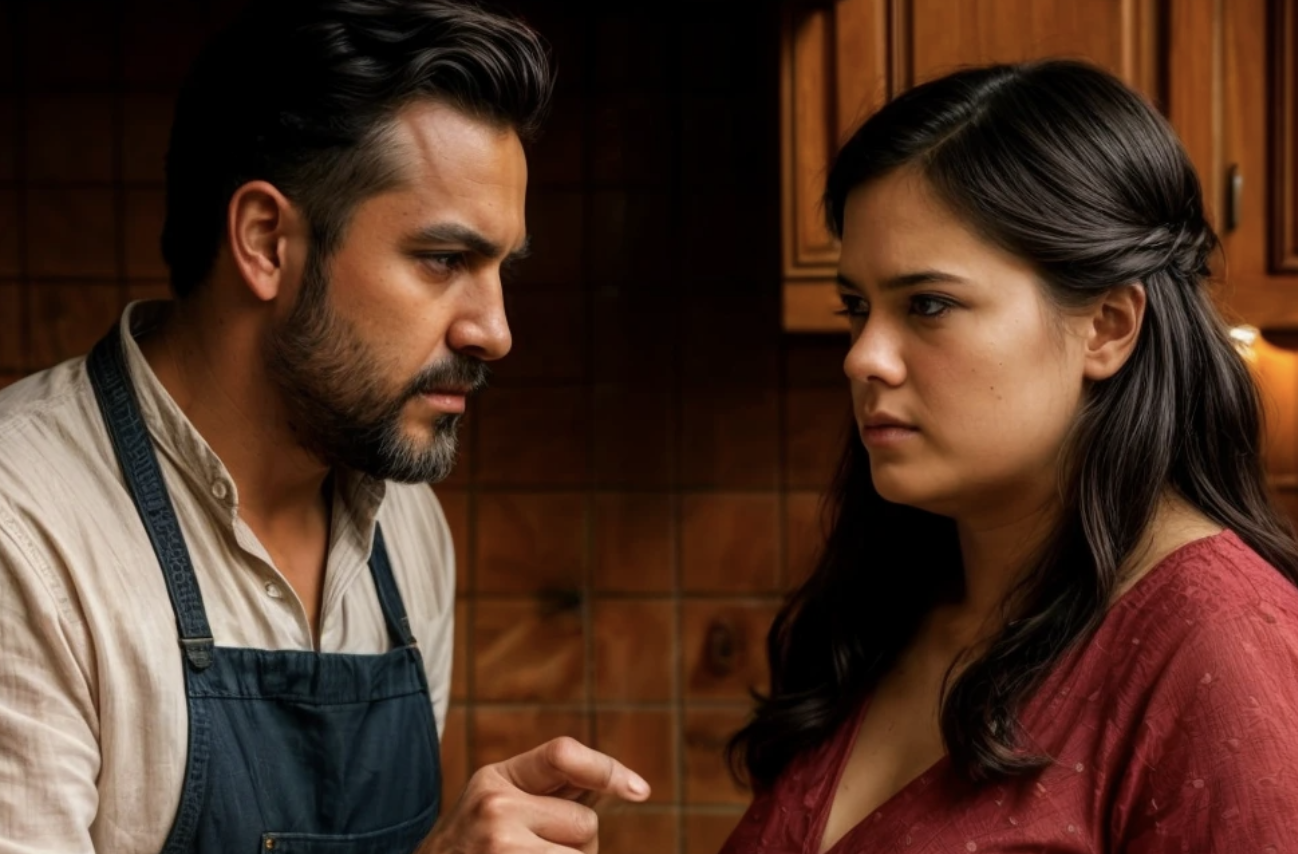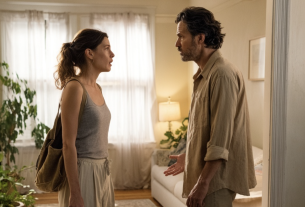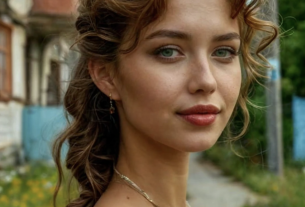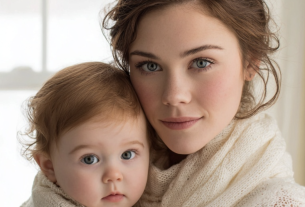Kolya Vorontsov had been used since childhood to having his merits recognized without question. His mother idolized him, teachers admired him, girls swooned. And how could it be otherwise? Tall, well-built, with a perpetual half-smile on his lips and a sly squint in his gray eyes. At university they called him “the lucky one”—he always got lucky on exams, and in life in general.
“Kolya, you were born under a lucky star,” his father, the gray-haired Anatoly Petrovich, an engineer at the railroad depot, often told him. “Just don’t get cocky—fortune is a capricious lady.”
Kolya would nod, but deep down he believed he deserved everything he had. When he met Marina in his senior year, he had no doubts—she was his. Slim, with a mane of red hair and a spray of freckles on her sharp little nose, Marina seemed to him the embodiment of everything he needed.
“Marry you? You?” Marina laughed brightly when he proposed after just a month of knowing her. “Nikolai Anatolyevich, you’re insane.”
But six months later they were married, and a year after that they moved into their own two-room apartment, which Kolya’s father helped them buy.
Married life flowed evenly and predictably. Marina worked at a bank; Kolya was building a career at a construction company. Everything was proper, as if following a script written by someone else. Until Vitya Solovyov appeared.
“Kolyan! Long time no see!” Vitya popped up in the office doorway like a jack-in-the-box.
Kolya hadn’t seen his classmate in seven years. Vitya had changed: he’d grown a beard and put on weight, but his eyes were the same—restless, with golden sparks.
“How are you even doing? Married? Kids?” Vitya rattled on, waving his arms like he was conducting an invisible orchestra.
“Married. No kids yet,” Kolya felt a strange awkwardness in front of this whirlwind of energy.
“I’ve been traveling the world, got stuck in Asia for three years. Now I’m back, opening a business. Hey, let’s get together, sit down, relive the old days? Bring your wife—I’ll come with my Sveta. We’ll get acquainted, have a drink, chat.”
Kolya agreed, although something inside him resisted. Marina wasn’t enthusiastic about the idea of dinner with an old classmate.
“Kolya, why? We don’t know him—we haven’t seen him in ages,” she said as she washed the dishes without turning around.
“Not ages—seven years,” Kolya corrected her. “Is it so hard for you to cook dinner? No need to waste money on a restaurant.”
Marina shrugged.
“As you say. When should we expect them?”
On Saturday, Vitya showed up with his wife—a petite blonde with huge blue eyes. Svetlana, or Sveta as she introduced herself, didn’t talk much, but she smiled often and sincerely.
“Nice digs!” Vitya whistled, looking around the apartment. “Kolyan, you’ve set yourself up nicely!”
Kolya proudly showed off the home he and Marina had spent several years furnishing. Expensive furniture, the latest appliances, designer knick-knacks—everything spoke of comfort and taste.
“It’s very cozy here,” Sveta said quietly when she and Marina were left alone in the kitchen. “Did you come up with it all yourselves?”
“Mostly me,” Marina was spooning salad onto plates. “Kolya’s busy at work.”
“What do you do?” Sveta watched the hostess’s precise movements with interest.
“I work at a bank. Mortgage department.”
“Do you like it?”
For the first time Marina lifted her eyes to the guest.
“Not really. But it’s stable. And you?”
“I’m a photographer. Freelancer. When we lived in Thailand, I shot for travel magazines—now it’s mostly weddings and family shoots.”
“In Thailand?” Marina froze with the spoon in her hand. “You really lived there?”
“Three years,” Sveta smiled. “Vitya taught English, I took photos. Then there was Vietnam, Indonesia…”
Marina suddenly felt something tighten inside. She remembered how she’d dreamed of traveling, how she’d planned to see the world before settling down. But then along came Kolya, then the mortgage, then the job…
The evening turned out unexpectedly lively. Vitya told stories about life abroad, Sveta showed photos on her phone, and Marina laughed the way she hadn’t laughed in a long time. Kolya watched his wife in surprise—she seemed to glow from within as she listened to their guests’ stories.
“Listen, why don’t you come with us to Georgia in August?” Vitya suddenly suggested. “We’re renting a little house for two weeks—plenty of room. We’ll sit on the veranda, drink wine, hike in the mountains.”
“You’re kidding, right?” Kolya shook his head. “I’ve got work, and Marina does too…”
“I’d go,” Marina said suddenly, and the room fell silent.
When the guests left, Kolya rounded on his wife.
“Were you serious about that? What Georgia? We have other plans for vacation.”
“What plans, Kolya?” Marina gathered the dishes from the table. “Lying by the pool in Turkey? We do that every year.”
“So what? You don’t like it?”
“I do. But I want something different. Did you hear their stories? They lived, Kolya. Really lived.”
“So we don’t live, is that it?” He felt himself boiling over. “An apartment, a car, stable jobs—is that not a life to you?”
Marina sank wearily onto a chair.
“That’s not what I mean. It’s just… sometimes it feels like we’re stuck in a never-ending Groundhog Day. Work–home–vacation–work. And then retirement?”
The conversation left a bitter aftertaste. Kolya lay awake a long time thinking about what Marina had said. Was she really bored with him? Did their life truly seem bland to her?
A week later Vitya called again.
“Kolyan, make up your minds! Ticket prices will go up soon.”
“Look, I don’t know…” Kolya faltered. “Our vacation’s only in September…”
“Then take unpaid leave! Two weeks, that’s nothing. You only get one life, brother!”
After long arguments, Marina stood her ground. They bought tickets to Georgia, and to his surprise Kolya found himself looking forward to the trip. Maybe they really did need something to shake up their measured existence.
Tbilisi greeted them with heat and aromas. The little house Vitya had rented turned out to be an old stone building on the outskirts of the city, with a huge veranda and a view of the mountains.
“Well? How is it?” Vitya beamed as he showed them their room. “Not a five-star hotel, of course, but it’s got atmosphere!”
Kolya didn’t know what to say. The room was small, with a simple wooden bed and a dresser. No air conditioner, no TV.
“It’s wonderful,” Marina said, going to the window. “Look at that view!”
The first days were filled with excursions, wine tastings, and endless veranda conversations. Vitya knew the city like the back of his hand and took them to places you wouldn’t find in guidebooks. They ate in little family restaurants, drank homemade wine with random acquaintances of Vitya’s, and wandered old streets until dawn.
Kolya noticed how Marina was changing. It was as if she’d shed some invisible burden. She laughed louder, talked more, even moved differently—lightly, freely. One evening, as they sat on the veranda, Sveta began taking pictures.
“Can I shoot you two?” she aimed the lens at Kolya and Marina. “The light is so beautiful.”
“I’m not photogenic,” Marina waved her off.
“Everyone’s photogenic if you capture the right moment,” Sveta kept clicking the shutter. “Just relax and talk.”
A few days later Sveta showed them the shots. Kolya looked in surprise at the photos of his wife—she looked completely different. Bright, alive, with mischievous sparks in her eyes.
“Is that really me?” Marina examined the pictures skeptically.
“The real you,” Sveta smiled. “That’s how I see you.”
On the next-to-last day of their stay in Georgia, Vitya suggested driving into the mountains to a village where a winemaker he knew lived.
“Are you out of your mind?” Kolya protested. “There’s a serpentine road up there, and your car is ancient—with no air conditioning.”
“But the views!” Vitya wouldn’t relent. “Come on, just for one night. We’ll be back tomorrow.”
Marina looked at her husband pleadingly.
“Kolya, let’s go? When will we come here again?”
And they went. Vitya’s old Opel wheezed around the turns but faithfully carried them higher and higher into the mountains. The road was narrow; sometimes the car passed just inches from a cliff. Kolya sat in the back seat, clutching the door handle, cursing the day he’d agreed to this adventure.
“We’re here!” Vitya announced happily, stopping in front of a small house surrounded by vineyards.
The host turned out to be an elderly Georgian with impressive gray mustaches and kind eyes. He didn’t speak Russian, but Vitya chatted fluently with him in Georgian, translating periodically.
“Gogi says we have to stay for dinner and try his wine,” Vitya explained. “Refusing would mortally offend him.”
Dinner lasted late into the night. Gogi told stories that Vitya translated; they drank homemade wine and ate khachapuri and shashlik. Kolya, tense at first, gradually relaxed. The wine was both tart and sweet, the night air was as intoxicating as alcohol, and the old winemaker’s tales made Kolya think about things he had never considered.
“He says a person should live where his soul sings,” Vitya translated Gogi’s words. “Otherwise life passes by.”
“And what if your soul doesn’t sing anywhere?” Kolya asked suddenly.
Vitya translated the question. Gogi looked closely at Kolya and replied.
“He says that doesn’t happen,” Vitya translated. “Sometimes we just stop listening.”
Back in Moscow, Kolya and Marina seemed to have brought a bit of that Georgian serenity with them. They often recalled the trip, rewatched the photos Sveta had sent. But gradually the routine took hold again. Marina returned to her bank job; Kolya threw himself into a new project.
In October, the unexpected happened. The company where Kolya worked announced mass layoffs.
“Don’t worry,” he reassured Marina. “My metrics are good—they won’t touch me.”
But he was one of the first to be let go. Kolya was in shock. He, always successful, always in demand, suddenly found himself overboard. In the first weeks he actively sent out résumés, went to interviews, but everywhere he got polite refusals. “We’ll call you back.” “We’re considering other candidates.” “Unfortunately, your experience doesn’t quite match our requirements.”
Marina quietly watched her husband’s turmoil. She didn’t reproach him, didn’t pressure him—she was simply there. One evening, as Kolya once again scrolled through job listings online, she sat down beside him.
“Maybe it’s a sign?”
“What sign?” he snapped irritably.
“That something needs to change. Try something new.”
Kolya shut the laptop.
“What are you talking about? We’ve got a mortgage, a car loan. We need money, not philosophy.”
“I know,” she said softly. “But maybe you should think about something you really enjoy doing?”
“I liked my previous job. Stable salary, growth prospects…”
“Did you really like it?” She looked him straight in the eyes. “Did you wake up every morning thinking, ‘How great that I’m going there’?”
Kolya wanted to retort but suddenly realized he couldn’t. No, he didn’t wake up with that thought. He woke up thinking he had to beat the traffic, that the report was due today, that he had to listen to the boss’s lectures…
“Do you remember what that old man in Georgia said?” Marina went on. “About living where your soul sings?”
Kolya was silent. He remembered that evening, the wine, the stars over the mountains, and the strange feeling of freedom that had washed over him then.
In November, Vitya called.
“Kolyan, how’s it going? I heard you got laid off. Don’t hang your head—we’ll get through it!”
Reluctantly, Kolya told him about his unsuccessful job search.
“Listen, want to join us?” Vitya suddenly suggested. “Me and the guys are spinning up a business—tours for foreigners to unusual places in Moscow. Not a gold mine, sure, but it’s enough to live on. And freedom—you come when you want, leave when you want.”
“I don’t know English at that level,” Kolya waved it off.
“But you’re a born Muscovite! You know the city like the back of your hand. And anyway, you can learn.”
Kolya promised to think about it, but deep down he had doubts. A tour guide? That’s not serious. That’s for students or retirees, not for a seasoned professional.
Yet the longer his unemployed drift went on, the more he thought about Vitya’s offer. One day he decided just to see how it worked and asked to tag along on a tour.
The group consisted of five Americans and a British couple. Vitya led them through Moscow courtyards, showing graffiti and telling stories of ghosts in old buildings, of secret underground passages, and of the legends attached to each place. Kolya watched with surprise as the city transformed in his friend’s stories—walls came alive and the listeners’ eyes lit up.
“Well?” Vitya asked after the tour. “Impressed?”
“Honestly? Yes,” Kolya admitted. “I had no idea there was so much interesting stuff in these places.”
“That’s because you’re used to the same routes. Home–work–supermarket. But the city is huge, alive, full of stories.”
That evening Kolya walked for a long time through the center of Moscow, examining buildings in which he had never noticed the moldings, the bas-reliefs, the whimsical window frames. He suddenly realized he had never truly seen the city where he’d lived all his life.
At home, a surprise awaited him. Marina was sitting in the kitchen, eyes shining.
“Kolya, I’ve been offered a promotion. With a relocation.”
“Where to?” He sat down opposite her.
“Sochi. The bank is opening a new branch there—they need a head of the mortgage department. Higher salary, company housing…”
Kolya looked at his wife and didn’t recognize her. She seemed to glow from within, speaking quickly and gesturing.
“And you want to go?” he asked cautiously.
“Why not?” She shrugged. “What’s keeping us here? We can rent out the apartment, sell the car…”
“And me?” Kolya blurted out. “I’m supposed to drop everything and go with you?”
Marina fell silent, studying her husband.
“No, Kolya. You’re not supposed to. You can stay here and keep looking for your dream job. Or you can come with me and try something new.”
They talked all night. Marina told him about the offer, the prospects, and how much she wanted change. Kolya listened and gradually realized that for the first time in a long while his wife truly wanted something. She wasn’t just drifting along, playing a role prescribed by society—she was genuinely striving for something.
“I’ll think about it,” he said by morning. “Give me time.”
Kolya spent the next few days in thought. He wandered the city, remembered their life together, and wondered whether they were truly happy or just following some imposed script.
One evening the doorbell rang. Vitya stood on the threshold with a bottle of wine.
“I can tell you need to talk.”
They sat in the kitchen, drinking Georgian wine Vitya had somehow procured, and talked.
“What’s keeping you here?” Vitya asked. “A job? No. Your parents? They’re in another city. Friends? Well, I can come visit you.”
“It’s not that simple,” Kolya sighed. “We’ve spent so many years building a life here…”
“And what have you built?” Vitya looked at him seriously, without his usual smirk. “An apartment under mortgage? A prestigious job you lost? What else?”
Kolya was silent. He suddenly realized he couldn’t name anything that truly bound him to Moscow. Everything he really valued was Marina. And she wanted to leave.
“You know,” Vitya went on, “when Sveta and I left for Thailand, everyone said we were crazy. Leaving a promising job, an apartment… But we just realized we wanted more out of life. Not money, not status—experiences, growth, freedom.”
“And you don’t regret it?”
“Not for a second,” Vitya smiled. “There were difficulties, sure. But we’re alive, healthy, and happy. Isn’t that the point?”
After Vitya left, Kolya sat on the balcony a long time, looking at the night city. He remembered the Georgian winemaker’s words about living where your soul sings. He remembered how Marina shone during their trip to Georgia—how she laughed, how greedily she absorbed new impressions. And he compared that with their usual life, where she quietly and unobtrusively did what was expected—worked, cooked, kept the home cozy.
In the morning he made his decision.
“I’m going with you,” he told Marina over breakfast. “Let’s try a new life.”
She looked at him skeptically.
“Really? You won’t hold it against me later?”
“I won’t,” he smiled. “Maybe it’s what we both need.”
Packing took two weeks. They rented out the apartment, sold some of their things, said goodbye to friends. Vitya promised to visit and bring a bottle of that same Georgian wine.
Moving to Sochi turned out not to be as scary as Kolya had imagined. The company apartment was small but cozy, with a view of the sea. Marina threw herself into work, and Kolya… Kolya suddenly discovered he liked being a homemaker. He cooked, explored the city, took photographs—Sveta had taught him the basics during their trip to Georgia.
One day, walking along the promenade, he saw a notice: “Tour guide needed with knowledge of the city’s history. Training possible.” Kolya didn’t even understand why he wrote down the phone number and called.
A month later he was already leading groups of tourists through little-known corners of Sochi, telling them about architecture, history, and legends. It turned out he had a talent for captivating people with stories, for making them see beauty in ordinary things.
One evening, when Marina came home from work, Kolya was cooking dinner.
“Why are you at the stove?” she asked, surprised. “It’s my turn today.”
“Your guests are arriving—so you should be at the stove,” Kolya said evenly.
“What guests?” Marina didn’t understand.
The doorbell rang. Vitya and Sveta stood on the threshold with suitcases.
“Surprise!” Vitya flung his arms wide. “We’re here for a week. Will you have us?”
That evening they sat on the balcony, looked at the sea, and drank Georgian wine. Vitya talked about his new projects, Sveta showed photos, Marina shared her successes at work. Kolya was silent, watching them and thinking how strange life can be.
“Do you regret it?” Marina asked him quietly when they were alone.
“Regret what?”
“Leaving. Changing everything.”
Kolya looked at the sea, at the stars above it, at the sleeping city.
“No, I don’t. You know, I realized something: it’s not about the place, but how you relate to it. You can live in one city your whole life and never see its beauty. Or you can discover something new every day right where you are.”
Marina laid her head on his shoulder.
“So where does your soul sing, Kolya Vorontsov?”
He was silent for a moment, gazing at the night city.
“You know, I always thought happiness was some final destination. A prestigious job, a downtown apartment, status. Turns out it’s simply the ability to choose your own path.”
Three years passed. Kolya stood on the promenade, studying the building he and Sveta had just bought for their tour bureau. An old house with peeling plaster and a wonderful history. He and Vitya had developed a whole network of routes along the Black Sea coast, and business was going well.
The phone rang. Marina.
“How did it go?” Kolya asked.
“I turned it down,” her voice was firm and calm. “They offered me a transfer to Moscow, to the head office. Said it would be a career step—twice the money.”
“And what did you tell them?” Kolya squinted at the sea.
“That my price is higher,” she laughed. “Don’t look so surprised. I realized offers like that will keep coming. And every time we have to decide whether we really need it—or if it’s just the temptation to slip back into the old rut.”
“Do you have any regrets?”
“About what?” She paused. “That we no longer measure success by square meters and salary figures? No, I don’t.”
Friends gathered that evening for a house-warming. Kolya looked at them and thought how strangely life had turned out. Vitya with his crazy ideas, Sveta with a camera slung over her shoulder, new friends they never would have met if they’d stayed in Moscow.
“What are we toasting to?” Vitya asked, raising his glass.
“To the resolve to change the rules of the game,” Kolya replied. “Once you realize that playing by someone else’s rules means you inevitably lose.”
The doorbell rang. A courier delivered a parcel from Georgia—a bottle of wine from old Gogi with a note, clumsily written in Russian: “When the soul sings, the sound carries far.”
Kolya thought this wasn’t the end of the story. Not even the middle. Just one of the turns on a long road with climbs and descents and stops. But the main thing was that they themselves chose where to go next.
The anxiety that had pursued him all his life—the fear of making the wrong choice, of missing something important—dissolved without a trace. He no longer clung to the illusion of control. There was no guarantee that tomorrow everything wouldn’t fall apart—business, relationships, health. But now that didn’t scare him.
“You know what’s strangest?” he said to Marina late that night after the guests had gone. “I used to think freedom was being able to do whatever you want. Turns out real freedom is not being afraid to lose what you have.”
Marina looked at him seriously.
“And if you do lose it?”
“Then we’ll start over,” Kolya shrugged. “Isn’t that the point?



